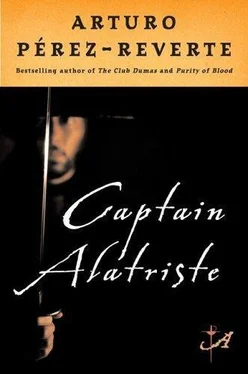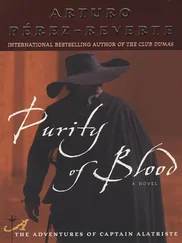Arturo Perez-Reverte - Captain Alatriste
Здесь есть возможность читать онлайн «Arturo Perez-Reverte - Captain Alatriste» весь текст электронной книги совершенно бесплатно (целиком полную версию без сокращений). В некоторых случаях можно слушать аудио, скачать через торрент в формате fb2 и присутствует краткое содержание. Жанр: Старинная литература, на английском языке. Описание произведения, (предисловие) а так же отзывы посетителей доступны на портале библиотеки ЛибКат.
- Название:Captain Alatriste
- Автор:
- Жанр:
- Год:неизвестен
- ISBN:нет данных
- Рейтинг книги:3 / 5. Голосов: 1
-
Избранное:Добавить в избранное
- Отзывы:
-
Ваша оценка:
- 60
- 1
- 2
- 3
- 4
- 5
Captain Alatriste: краткое содержание, описание и аннотация
Предлагаем к чтению аннотацию, описание, краткое содержание или предисловие (зависит от того, что написал сам автор книги «Captain Alatriste»). Если вы не нашли необходимую информацию о книге — напишите в комментариях, мы постараемся отыскать её.
Captain Alatriste — читать онлайн бесплатно полную книгу (весь текст) целиком
Ниже представлен текст книги, разбитый по страницам. Система сохранения места последней прочитанной страницы, позволяет с удобством читать онлайн бесплатно книгу «Captain Alatriste», без необходимости каждый раз заново искать на чём Вы остановились. Поставьте закладку, и сможете в любой момент перейти на страницу, на которой закончили чтение.
Интервал:
Закладка:
As for the regulars at the Tavern of the Turk, in his presence no one spoke of dark deeds or of women; that was the condition upon which his company was based: tolerance, and friendship. Quarrels and affairs, he often said, I will deal with in the confessional. And when his ecclesiastical superiors reproached him for passing time in the tavern with poets and swordsmen, he responded that saints save themselves, while sinners must be sought out. I will add on his behalf that he barely tasted his wine and I never heard him speak ill of anyone. Which in the Spain of that day— and today as well—was something unheard of in a cleric.
"Let us be prudent, Senor Quevedo," he added affectionately that day, after his comment in Latin. "You, sir, are not in a position to speak ill of certain things aloud."
Don Francisco looked at the priest, adjusting his eyeglasses. "I? Speak ill? You err, Domine. I do not speak ill, I merely state the truth."
And then he stood, and turned toward the rest of those in the tavern, reciting, in his educated, sonorous, and clear voice:
"I shall speak out, despite appeals.
You touch first your lips, and then your brow
Counseling silence or threatening fear.
Should not a man hold courage dear?
Must he not feel the thing he says?
Must he not say the thing he feels? "
Juan Vicuna and Licenciado Calzas applauded, and El Tuerto Fadrique nodded gravely. Captain Alatriste looked at Don Francisco with a broad, melancholy smile, which the poet returned. Domine Perez, acknowledging that the question the poet had posed was unanswerable, concentrated on his watered muscatel. The poet took up the charge again, now approaching it via a sonnet that he kept revising.
"I looked upon the walls of my fatherland, Though once strong, now tumbling down "
Caridad la Lebrijana came and took away the empty jars, asking for moderation before swishing away with a walk that captured all eyes except those of the domine, still absorbed in his muscatel, and of Don Francisco, sunk in combat with silent ghosts.
"I walked into my home and saw
A ruin that nothing could assuage;
My staff, more curved and battered.
My sword, now dulled by age,
In all a memory of death:
Nothing was left ...
nothing that mattered."
Some strangers strolled into the tavern, and Diego Alatriste placed a hand on the poet's arm, calming him. "The memory of death!" Don Francisco repeated in conclusion, lost in his own thoughts. He sat, however, and accepted the new jar the captain offered him.
In truth, Senor Quevedo's days at court were spent with orders of arrest or exile hanging over his head. Although occasionally he bought a house whose administrator milked him of the rents, that may have been the reason he had never wanted a fixed residence in Madrid, and tended to take lodgings in public inns. Truces from his adversaries, like periods of prosperity, were brief for this singular man, the hobgoblin of his enemies and delight of his friends, who one moment might be mingling with nobles and scholars and the next scrabbling in his purse for the last maravedi. Changes of fortune ... which so loves to change, and almost never for the better.
"We have no choice but to fight," the poet added after a few seconds.
His tone was pensive, as if for himself only; one eye was
swimming in wine, and the other had gone down for the last time. Alatriste, still holding his friend's arm and bending over the table, smiled with affectionate sadness. "Against whom, Don Francisco?"
The captain seemed almost not to expect an answer. Quevedo raised one finger. His eyeglasses had slipped from his nose and were dangling from their cord, nearly dipping into his wine.
"Against stupidity, evil, superstition, envy, and ignorance," he enunciated slowly, and as he spoke, he appeared to regard his reflection on the surface of the liquid. "Which is to say, against all Spain. Against everything."
I was listening from where I was sitting by the door, intrigued and uneasy. I intuited that behind Don Francisco's bad-humored words lay dark reasons that he himself could not comprehend, but that went beyond simple tantrums and sour character. I, at my tender age, still did not know that it is possible to speak harshly about what we love, precisely because of that love, and with the moral authority that love bestows upon us. Later, I was able to understand that the state of affairs in Spain was very painful to Don Francisco. A Spain still formidable from without, but one that despite the pomp and artifice, despite our young and charming king, our national pride and our heroic battles,
Spain had begun to doze, trusting in the gold and silver that the galleons brought from the Indies. But all that gold and silver disappeared into the hands of the aristocracy, and of lazy, corrupt, and unproductive officials and clergy who squandered it in vain undertakings such as financing the costly war renewed in Flanders, where providing a pike, that is, a new pikeman or soldier, cost an eye and a leg.
Even the Low Dutch whom we were fighting sold us their manufactured products and made commercial deals right in Cadiz, acquiring the precious metals that our ships—which had to outmaneuver pirates—brought from the lands to the west. Aragonese and Catalans were shielded by their laws; Portugal was patched together; commerce was in the hands of foreigners; finances were the purview of Genoese bankers; and no one worked except the wretched peasants, exploited by the tax collectors of the aristocracy and the king. And in the midst of all that corruption and madness, moving against the course of history, like a beautiful, terrifying animal that still slashed and clawed yet at the heart was eaten by a malignant tumor, our poor Spain was worm-eaten inside, condemned to an inexorable decadence that did not escape the clear eyes of Don Francisco de Quevedo. But I, at that time, could see nothing but the daring of his words, and I kept looking anxiously outside, expecting at any moment to see the catchpoles of the corregidor appear with a new warrant for Don Francisco's arrest, to punish his arrogant lack of caution.
That was when I saw the carriage. It would be shading the truth to deny that I was waiting for it to pass, for it drove up Calle Toledo two or three times a week, more or less at the same hour. It was black, lined with leather and red velvet, and the coachman was not in the coach box driving the mules but, rather, rode one of them—the normal procedure for that kind of carriage. The coach itself was solid but discreet, typical of owners who enjoyed a good position but had no right, or inclination, to parade their wealth. Someone like a rich merchant or a high official who, while not privileged nobility, held a powerful post at court.
As for me, I was interested only in the contents, not the container. In that still-childlike hand, white as rice paper, that was just visible, resting discreetly on the frame of the small window. In that golden gleam of long, blond curls. And in those eyes. Despite the years that have passed since I First saw those eyes, and the many adventures and troubles those blue irises would bring to my life in the years that followed, still today I am incapable of expressing in writing the effect of that bright, pure gaze ... so deceptively limpid, and of a color identical to the Madrid skies that Don Diego Velazquez, later the favorite painter of our lord and king, learned to paint like no other.
At the time of my story, Angelica de Alquezar must have been around eleven or twelve years old, and she was already a promise of the splendid beauty she would become, beauty of which Velazquez himself would give a good account in the famous portrait she posed for sometime around 1635. But more than a decade earlier, on those March mornings just before the adventure of the Englishmen, I did not know who the youthful, almost childish girl was who every two or three days rode in her carriage up Calle Toledo toward the Plaza Mayor and the Alcazar Real, where—I later learned—she attended the queen and young princesses as a menina, a lady-in-waiting. That privilege was due largely to the position of her uncle from Aragon, Luis de Alquezar, at the time one of the king's most influential secretaries. To me, the young blonde girl in the carriage was simply a celestial, wondrous vision; she was as far removed from my poor mortal condition as the sun or the most beautiful star is from this corner on Calle Toledo, where the wheels of her carriage and the hooves of the mules arrogantly spattered anyone in their path.
Читать дальшеИнтервал:
Закладка:
Похожие книги на «Captain Alatriste»
Представляем Вашему вниманию похожие книги на «Captain Alatriste» списком для выбора. Мы отобрали схожую по названию и смыслу литературу в надежде предоставить читателям больше вариантов отыскать новые, интересные, ещё непрочитанные произведения.
Обсуждение, отзывы о книге «Captain Alatriste» и просто собственные мнения читателей. Оставьте ваши комментарии, напишите, что Вы думаете о произведении, его смысле или главных героях. Укажите что конкретно понравилось, а что нет, и почему Вы так считаете.










